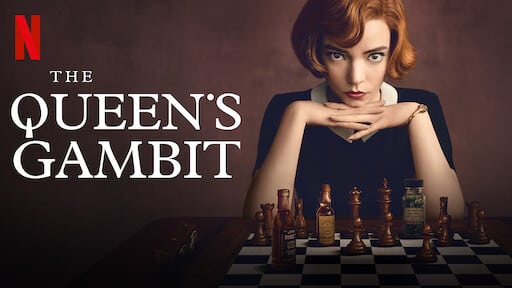I started to learn chess, but after twelve months, I quit.
After having watched The Queen’s Gambit on Netflix in 2020, chess caught my interest. Turns out that I was not alone in this particular fascination.

The popular TV show coincided with the proliferation of streaming genres beyond gaming. Turns out that streaming and chess are a match made in heaven.
Of course, I wasn’t the only one who discovered chess after The Queen’s Gambit — just as I wasn’t the only one who discovered Sudoku after finding the YouTube channel Cracking the Cryptic.
Still, I decided to teach myself more about chess.
Here we go:
The Three Parts of Chess
There are three parts to a game of chess. The opening, the middle game, and the end game. I didn’t know this. The saying goes that you should play the opening like a book, the middle game like a magician, and the end game like a machine. I didn’t know any of that, either.
Still, I found these three parts to be good starting points. 1I had the same approach when learning photography as I started my journey by focusing (pun intended!) on aperture, shutter speed, and ISO.
Play the Opening Like a Book
Computers have calculated all possible chess openings. So, you can play a particular opening to give yourself a favourable position on the board. If white plays a specific opening perfectly, you must counter it perfectly to minimise white’s advantage.
You could play an opening without knowing any openings by finding good moves. However, your opponent will likely gain a substantial advantage from knowing their opening theory by heart. There are too many variations for a human brain to calculate over the board.
So, if you want to play a decent chess game, you must study openings. Simple as that.
Play the Middle Game Like a Magician
Both sides will soon run out of prepared moves with all possible variations. It typically happens when most pieces are developed. So, when you enter the middle game, you’re left with only your strategic brilliance, creative ideas, and ability to do calculations. And so is your opponent.
And in the middle game, many pieces are still left on the board. And lots of pieces on the board mean — complexity.
Is there a way to invoke magic? Well, having played thousands and thousands of chess games will help. Being a bonafide genius doesn’t hurt, either. If you haven’t had time to play that many games and weren’t blessed with mental superpowers at birth, a solid understanding of chess principles will go a long way.
Play the End Game Like a Machine
Most end games have already been solved. So, if you’ve managed to survive until most pieces are off the board and you’ve got the advantage in terms of material or position, the game is yours to lose. It’s like an equation waiting to be solved. You need to enter the correct answer — and the win is yours.
Mess up, and you’re handing a draw or a loss over to your opponent on a silver platter.
You either convert a winning position into a win or defend ideally to increase the odds of having your opponent make a mistake. Alas, it would help if you practised how to solve end games, preferably under time pressure.
Chess and Time
Here’s another critical aspect of the game I had never considered before watching The Queen’s Gambit:
Chess is a timed game.
I had seen chess clocks in movies before, of course. But it had never occurred to me that time was a huge factor to consider in playing the game.
In classical chess, players typically get lots of time to think. Players do run out of time. For some reason, I thought all chess matches ended with a checkmate or a draw.
Instead, I discovered the fantastic world of bullet, rapid, and blitz games.
And I learned that the clock decides lots of games. You could have a winning position, but that doesn’t matter if your clock runs out.
So, how did I go about improving my game?
Chess Openings
I’m passionate about learning new things, but my motivation has limits. To put it mildly, studying chess openings en masse isn’t my idea of a good time.
So, I learned about openings involving moving the pawn in front of my white king first. I’ve only just scratched the surface here. But I prefer to know more about one specific type of opening than too little about too many openings.
As for openings with black? I’ve picked up a few famous lines, but only a small number of turns deep. Work in progress.
Still, a little knowledge about openings goes a long way, especially if you’re playing against people without the slightest idea about openings.
General Chess Knowledge
But the most significant improvement in my chess game was learning a few basic chess principles. Such principles won’t apply to every scenario, but they’re still good to know.
Here’s a quick rundown of some basic chess principles that have served me well during my first twelve months of play:
Watching Chess Streamers
I should also mention that I’ve learned most of what I know from watching chess streamers play and analyse games. It’s not just about the knowledge they share, but to hear them think out loud throughout games has helped me develop an inner chess voice that speaks to me during play.
Weird, I know. 2My inner chess voice sounds like Levy “GothamChess” Rozman!
But it helps me find better moves and blunder less.
And it’s great entertainment!
Read also: “For Content!”
Why I Will Quit Chess
I don’t know what my chess rating is today. I can comfortably beat the 1300 – 1500 chess bots on Chess.com. Twelve months ago, I lost three times in a row against a bot ranked at 700. That’s progress, I guess.
I could begin playing online against people I don’t know — and get a real online rating. But, I won’t do that.
After twelve months of trying to learn chess, I’ve learned this:
So — I quit.
And that’s fine. The endeavour has allowed me to appreciate watching other great players more. My respect for their abilities (and their hard work!) has grown immensely.

THANKS FOR READING.
Need PR help? Hire me here.

PR Resource: More Projects
Spin Academy | Online PR Courses

Improvement: Renaissance Projects
The Renaissance lasted from the 14th to the 17th century and was a period of significant cultural, artistic, political, and scientific rebirth in Europe.
Inspired by the Renaissance mindset, I strive to develop my creative intelligence, physical strengths, and mental well-being.
Better Identity
Better Thinking
Better Skills
Better Habits
Learn more: Creativity
💡 Subscribe and get a free ebook on how to get better PR.

Annotations
| 1 | I had the same approach when learning photography as I started my journey by focusing (pun intended!) on aperture, shutter speed, and ISO. |
|---|---|
| 2 | My inner chess voice sounds like Levy “GothamChess” Rozman! |


